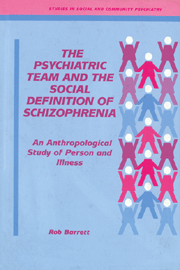 The Psychiatric Team and the Social Definition of Schizophrenia
The Psychiatric Team and the Social Definition of Schizophrenia Published online by Cambridge University Press: 05 August 2016
This study was carried out while I was employed as a psychiatrist at ‘Ridgehaven Hospital’. I experienced a tension between my two roles—ethnographer and psychiatrist—similar in kind to that experienced by most anthropologists when they participate in the social group they are observing. Perhaps I felt it more keenly than most because the role of a psychiatrist was so conspicuous in Ridgehaven Hospital.
My education and professional training have oscillated between anthropology and psychiatry. After graduating in medicine and working as an intern in a general hospital, I completed undergraduate studies in anthropology. This period was followed by postgraduate training in psychiatry. After that I began working part-time at Ridgehaven as specialist psychiatrist and undertook this study as part of a doctoral programme in anthropology.
I thus brought to the study a fluency in the language of medicine and psychiatry. It was an undoubted asset but also an impediment; my familiarity with the world of the psychiatric hospital and its language often made it difficult for me to perceive the taken-for-granted assumptions on which that world was built. It was only with the assistance of my anthropologist colleagues, who continually insisted that I maintain a sense of curiosity about what I normally regarded as self-evident, that I was to make use of my cultural competence in an analytic way.
Being a member of the staff facilitated my entry into fieldwork. It gave me access to the clinical sphere of hospital life from which a nonclinician might have been excluded on grounds of confidentiality. I was also drawn quickly into administrative domains of the hospital. Once it became known that I was interested in studying how people wrote in case records I was press-ganged into chairmanship of the hospital's medical records committee, a position that thrust me into the interface between the administrative and clinical divisions of the hospital, an area of conflicting pressures. As the same time, because I was already identified as a psychiatrist, I had to work hard to establish myself as an anthropologist, which involved bridging the social boundaries that separated the various professional and occupational groups. I found it fairly easy to undertake field-work with psychiatrists, psychiatric nurses, and social workers; but it was only by persevering that I gradually gained the trust of domestic cleaners and pantry maids.
To save this book to your Kindle, first ensure no-reply@cambridge.org is added to your Approved Personal Document E-mail List under your Personal Document Settings on the Manage Your Content and Devices page of your Amazon account. Then enter the ‘name’ part of your Kindle email address below. Find out more about saving to your Kindle.
Note you can select to save to either the @free.kindle.com or @kindle.com variations. ‘@free.kindle.com’ emails are free but can only be saved to your device when it is connected to wi-fi. ‘@kindle.com’ emails can be delivered even when you are not connected to wi-fi, but note that service fees apply.
Find out more about the Kindle Personal Document Service.
To save content items to your account, please confirm that you agree to abide by our usage policies. If this is the first time you use this feature, you will be asked to authorise Cambridge Core to connect with your account. Find out more about saving content to Dropbox.
To save content items to your account, please confirm that you agree to abide by our usage policies. If this is the first time you use this feature, you will be asked to authorise Cambridge Core to connect with your account. Find out more about saving content to Google Drive.